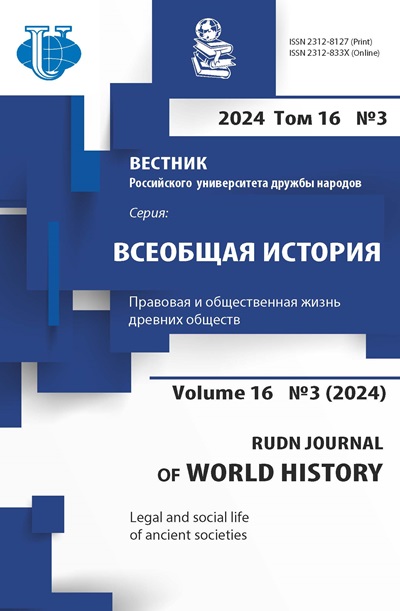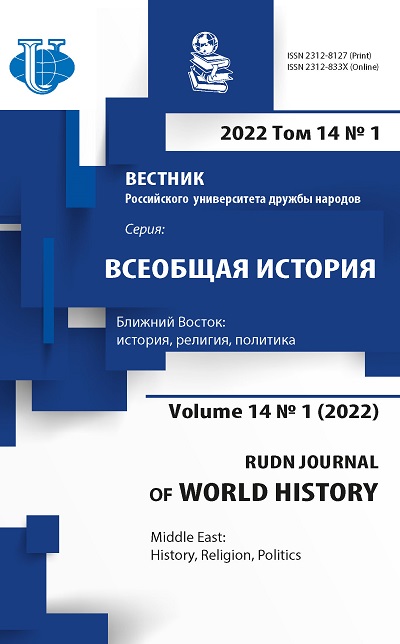Влияние исламской этики на политику кибербезопасности в Иране
- Авторы: Муллахметова Д.И.1, Куделин А.А.1,2
-
Учреждения:
- Национальный исследовательский университет «Высшая школа экономики»
- Российский университет дружбы народов
- Выпуск: Том 14, № 1 (2022): Ближний Восток: история, религия, политика
- Страницы: 33-42
- Раздел: Религия и политика в странах Ближнего Востока
- URL: https://journals.rudn.ru/world-history/article/view/30335
- DOI: https://doi.org/10.22363/2312-8127-2022-14-1-33-42
Цитировать
Полный текст
Аннотация
В статье рассматривается влияние исламской этики на политику кибербезопасности в Иране, также представлены подходы правительства к формулированию политики кибербезопасности в стране. Исламская этика жизненно важна, потому что это основа хорошего общества. Каждый мусульманин должен вести себя в соответствии с исламским законом и должен помнить, что все действия имеют определенные последствия и человек несет ответственность за свое поведение. Многие недавние исследования были сосредоточены на проблеме исламской этики и ее влиянии на различные аспекты жизни мусульман. Взаимосвязь между исламской этикой и информационными технологиями становится теснее, что в наши дни трудно представить жизнь без них. С появлением информационных и коммуникационных технологий необходимо сосредоточиться на этических основах, способных регулировать киберпространство.
Об авторах
Диана Ильдаровна Муллахметова
Национальный исследовательский университет «Высшая школа экономики»
Автор, ответственный за переписку.
Email: dimullakhmetova@edu.hse.ru
магистрант факультета мировой экономики и мировой политики
101000, Москва, Россия, Мясницкая улица, 20Андрей Александрович Куделин
Национальный исследовательский университет «Высшая школа экономики»; Российский университет дружбы народов
Email: kudelin-aa@rudn.ru
ORCID iD: 0000-0002-4294-5032
кандидат исторических наук, доцент кафедры всеобщей истории Российского университета дружбы народов, доцент Школы востоковедения факультета мировой экономики и мировой политики Высшей школы экономики
101000, Москва, Россия, Мясницкая улица, 20; 117198, Москва, Россия, ул. Миклухо-Маклая, 6Список литературы
- Rahim AA. Understanding Islamic Ethics and Its Significance on the Character Building. International Journal of Social Science and Humanity. 2013;3(6):508-513.
- Smirnov AV. Etika i politicheskaya filosofiya. [Ethics and Political Philosophy]. M.: Institut Filosofii RAN; 2001. (In Russ.). Смирнов А.В. Этика и политическая философия. М., 2001.
- Omidi R., Shoraka M. The Internet in Iran. IEEE Technology and Society Magazine. 2002;21(1):28-32. Available from: https://www.researchgate.net/publication/3226615_ The_Internet_in_Iran [Accessed 23.08.2021].
- Obaidullah M. Ethical views on internet usage: An Islamic perspective. Daily Sun. 2019 January 11. Available from: https://www.daily-sun.com/arcprint/details/363287/Ethical-views-on-internet-usage:-An-Islamic-perspective/2019-01-11 [Accessed 23.08.2021].
- Latt S., Akbar Shah M. Internet Usage from Islamic Perspective: A Preliminary Survey with First Year Medical Students, Kuantan Campus, Pahang 2015. International Journal on Recent and Innovation Trends in Computing and Communication. 2017;(5):207-213.
- The Press Law. Available from: https://www.wipo.int/edocs/lexdocs/laws/en/ir/ir013en.pdf [Accessed 23.08.2021].
- Fedotov А. Opyt regulirovaniya informacionnogo prostranstva v Irane. [Experience in Regulating the Information Space in Iran]. Digital Russia. 2020, November 5. Available from: https://d-russia.ru/opyt-regulirovanija-informacionnogo-prostranstva-v-irane.html [Accessed 23.08.2021] (In Russ.). Федотов А. Опыт регулирования информационного пространства в Иране. DigitalRussia. 2020. 5 ноября. URL: https://d-russia.ru/opyt-regulirovanija-informacionnogo-prostranstva-v-irane.html (дата обращения: 23.08.2021).
- Constitution of the Islamic Republic of Iran. Available from: https://www.wipo.int/ edocs/lexdocs/laws/en/ir/ir001en.pdf [Accessed 23.08.2021].
- Faaliyat dar faza-ye majazi az manzar-e Qur’an. [Activity in Cyberspace from the Perspective of the Qur’an]. MehrNews. 2017, August 7. Available from: https://www.mehrnews.com/news/4044094 [Accessed 23.08.2021] (In Pers.).
- Mausume Bakhshi Pur. Tarh-e Kalan va meamari-ye shabake-ye melli etelaat eblaq shod. [The Master Plan and Architecture of the National Information Network Were Announced]. Mehr news. 2021, October 21. Available from: https://www.mehrnews.com/ news/5052652 [Accessed 23.10.2021] (In Pers.).
- RSF unveils 20/2020 list of press freedom’s digital predators. Reporters without borders. 2020, March 12. Available from: https://rsf.org/en/news/rsf-unveils-202020-list-press-freedoms-digital-predators [Accessed 23.08.2021].
- Chao L., Rhoads C. Iran’s Web Spying Aided By Western Technology. The Wall Street Journal. 2009, June 22. Available from: https://www.wsj.com/articles/SB124562668777335653 [Accessed 23.08.2021].
- Iran steps up net censorship. BBC News. 2003, May 12. Available from: http://news.bbc.co.uk/2/hi/technology/3019695.stm [Accessed 23.08.2021].
- Police FATA va vazayef-e an. [Police FATA and Its Duties]. Donya. 2017, May 5. Available from: https://www.heyvalaw.com/web/articles/view/1407/پلیس-فتا-و-وظایف-آن.html [Accessed 23.08.2021] (In Pers.).
- Ceshkovskaya Y.U. Nacionalnaya informacionnaya set v Irane kak sposob zashchity ot kiberatak [Iran’s National Information Network as a Defence Against Cyber Attacks]. Pir-centr, 2020. Available from: http://www.pircenter.org/media/content/files/14/ 15029729650.pdf [Accessed 23.08.2021] (In Russ.). Цешковская Е.Ю. Национальная информационная сеть в Иране как способ защиты от кибератак. Пир-центр. 2020. URL: http://www.pircenter.org/media/content/files/ 14/15029729650.pdf (дата обращения: 23.08.2021).
- Islamic Penal Code of Iran. Available from: https://www.refworld.org/cgibin/texis/vtx/ rwmain/opendocpdf.pdf?reldoc=y&docid=52b812384 [Accessed 23.08.2021].
- Tabyin-e Akhlaq-e Resaneyi Maneyi Hattaki Dar Faza-ye Majazi va Siyasi Mishavad. [Media Ethics Prevents Insults in Cyberspace and Politics]. 2016, February 19. Available from: https://www.irna.ir/news/84210960 [Accessed 23.08.2021] (In Pers.).













